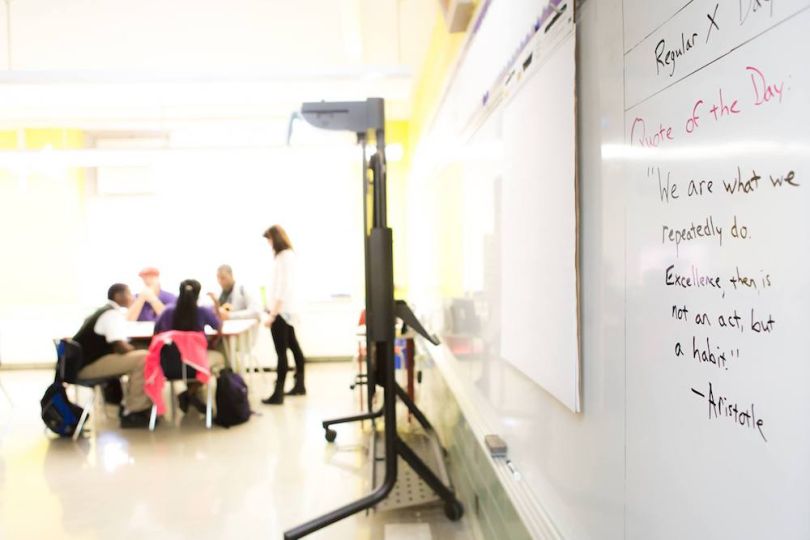In a hyper-competitive job market, connections to industry professionals can make a big difference for a recent grad trying to get their foot in the door. But for the college student who is the first in her family to graduate, or who comes from an under-resourced community, the pervasiveness of network-based hiring could hurt, rather than help.
“A lot of our student base doesn’t come from families that are exposed to these different career paths,” Tashiara Little, director of corporate engagement at charter high school Chicago Tech Academy, told Built In.
The ChiTech student body is about 79 percent Black and 18 percent Latinx, and most of them come from low-income or single-parent households, she said.
“They don’t have the social capital; they can’t call [their parents] to help connect them with ‘such and such’ so that they can interview for a job or use them as a reference.”
So, Little forges relationships with nearby tech companies that can offer opportunities, like internships, for ChiTech students.

Traditionally, internships function as a way for students and recent graduates to gain meaningful professional exposure and develop a rolodex of valuable contacts. But a 2014 survey by the National Association of Colleges and Employers shows that, of the 61 percent of graduating college seniors who had held an internship, nearly half were unpaid — a luxury that students without a financial safety net can rarely afford.
“Unpaid internships,” Liz Wessel wrote, “create systemic inequality.”
When social-capital-generating opportunities are inaccessible to all but those who already possess it, the tech industry’s existing diversity problem only gets reinforced — to its detriment.
“They don’t have the social capital; they can’t call their parents to help connect them.”
“When you look at the number of tech founders in the city of Chicago and who they are, you don’t see a lot of diversity,” Tiara Wheatley, ChiTech’s senior director of corporate engagement and philanthropy, told Built In. “Typically they bring on people they know, who they’ve worked with in the industry. And if [our students are] not there in those spaces, [they] don’t have that connection.”
ChiTech is looking to change that. By connecting its students to high-impact opportunities, the school aims to equip them to compete for 21st-century jobs — shrinking the social capital gap and making inroads toward a more diverse and inclusive tech industry.

Project-Based Learning
Chicago Tech Academy, now a high school of nearly 400 students, was founded in 2009 by Chicago city leaders who wanted to create a pipeline from the city’s high schools to its burgeoning tech scene. Five years into the experiment, the school refocused its efforts, taking cues from charter school network High Tech High, which emphasizes project-based learning.
The heart of the project-based learning framework is to give students the sense that what they’re learning in the classroom has real-world applications and consequences. Students don’t only learn to code, for example — they learn to code in context. That way, their newly acquired skills don’t get stuck at the level of theoretical knowledge.
“We try to connect everything to something that is happening either in our communities, in our city, in the world, to make things a little bit more relevant for students,” Wheatley said. “It typically culminates in some type of presentation of learning where we invite our industry professionals in to see the work that our students have done, how they connect it to problems that organizations just like theirs may be facing.”
“We try to connect everything to something that is happening in our communities ... to make things a little bit more relevant for students.”
A few years ago, for example, ChiTech students researched the topic of book deserts: geographic areas where it’s hard to find books. They documented neighboring communities that qualified as book deserts, organized a fundraiser and used the proceeds to install book-sharing boxes throughout the communities and donate books to their libraries.
ChiTech’s students are also required to participate in a number of outside-the-classroom initiatives.
Every other Friday, ChiTech invites a business leader to come in and talk about their professional experiences over lunch. About a dozen students attend, each armed with questions they prepared ahead of time while scrolling through the guest’s LinkedIn profile.
ChiTech students also have the opportunity to visit a company’s offices, where they meet a mentor and learn a new skill. These can range from how to ace an interview, to how to network or how to polish a resume.
Field trips, too, are part of the curriculum. But not the kind you’re thinking of. “A lot of schools take trips to the zoo,” Little said. “We take our students to different businesses to help expose them to what an office environment looks like and get a chance to meet and network with employees.”
Perhaps the crown jewel of ChiTech’s immersive initiatives is its internship program. Every afternoon for one month, junior students work onsite at a partnering company. Over the course of four weeks, they’ll do real work and produce tangible results.

Tech Internships Add Value for Everyone Involved
Eric Sands was the vice president of product development at a software company when he first met a student (we’ll call him Tim) from ChiTech that matched with his team.
Tim was expected to treat the internship like a real full-time job. Likewise, Sands and his team were expected to treat the student as they would a regular intern.
On day one, Sands’ team onboarded Tim, walking him through his month-long work plan as the company’s new junior scrum master. Tim was tasked with taking a user story from the company’s backlog, collaborating with engineers and helping design a feature to be implemented. He needed to write the underlying code as well as automate tests.
This wasn’t busy work, Sands told Built In. Tim was asked to help the team deliver something of value to the company’s customer.
At the end of the month, Tim stood up during a sprint review and presented his work to the company’s stakeholders.
“He showed the code that he worked on and the code compile and the tests run and pass,” Sands said. “It was exciting. I would say it was successful. He was able to achieve his goal.”
Asked to share what he perceived to be the biggest challenge for the ChiTech intern, Sands said it was just getting adjusted to a new environment and a new team.
For many ChiTech students, internships mark the first time they’ve stepped foot inside a downtown office — or, in some cases, visited downtown Chicago at all.
“A lot of our students don’t travel outside of their neighborhoods,” Wheatley said. “All of these experiences for them are mind blowing. But that’s exactly what we wanted it to be.”
“A lot of our students don’t travel outside of their neighborhoods.”
According to Sands, the adjustment period passed quickly, and it wasn’t long before Tim and the rest of the team were enjoying inside jokes and going out to lunch with each other.
Sands was also quick to point out that ChiTech students added real value to his team. Not only did students help produce results for the company, but they also provided an opportunity for Sands’ more junior colleagues to hone their coaching skills.
“The internships benefited our company probably as much as they’ve benefited the students,” he said.
Remote Education Amplifies the Digital Divide
When the pandemic outbreak hit this spring, ChiTech students and faculty were sent home. And most of their immersive-learning experiences were ground to a halt.
The school supplied students with laptops, but even so, it was unable to account for all the varied at-home situations, such as lack of reliable Wi-Fi access, that might impede distance learning.
“We saw the digital divide play out when we pivoted to remote learning,” Little said.
“We saw the digital divide play out when we pivoted to remote learning.”
Many of ChiTech’s unique offerings — including the internship — were canceled.
“Lots of companies were trying to figure out what to do with their own employees, let alone take on students,” Little said.
With the new school year on the horizon, ChiTech is busy planning how it will continue these initiatives, albeit modified, virtual versions of them.
Indeed, several Chicago tech companies have already contacted the school about partnering with them for the student internship program — whatever it ends up looking like in what is shaping up to be a unique school year for schools everywhere.

Does the Model Work?
Is modeling a high school like ChiTech enough to help students from less-resourced communities break the barriers to entry into the tech industry?
Since it pivoted to project-based learning a few years ago, ChiTech has only had a handful of graduating classes. There isn’t enough data yet to look at results, but school administrators are confident they are headed in the right direction.
“We’ve definitely sparked some curiosity with a few of them,” Little said.
She highlighted the story of one student, a young woman who initially wanted to be an artist.
Little wanted to expose the student to tech opportunities before she made up her mind for good: “I just kept making her do things and come out. She was really good at coding.”
Only 26 percent of professional computing jobs are held by women. And among all women working in computer and information science roles, just 12 percent are Black or Latinx.
Over time, the student came to enjoy her tech projects, and she got connected to an internship. Eventually, she received a scholarship from Boeing and Motorola for declaring a STEM major.
“So I see that it works,” Little said.
“We definitely sparked some curiosity with a few of them.”
Wheatley is focused on seeing a higher rate of her students study STEM and carve out roles in the tech industry. She, too, is encouraged by early signs.
She shared the story of two ChiTech alumni who went on to graduate with computer science degrees from DePaul University. After that, they returned to ChiTech — except this time, as employees in the school’s tech department.
“We feel proud that we now have alumni who have computer science degrees working in our tech department to improve the infrastructure here at the school that gave them their starts in that industry,” Wheatley said.
She emphasized that ChiTech — and schools looking to it as a model — needs to continue to expand student’s horizons by exposing them to new opportunities, networks and jobs.
She takes heart in the strides the tech industry is making in diversity and inclusion. But she believes there is still much work to be done, particularly when it comes to which colleges companies focus their recruiting efforts on.
“I think organizations and tech companies in Chicago have to be open and willing to recruit at the schools that our students attend,” Wheatley said.
“We want organizations to understand that our students, just as well as anybody else, are capable of doing the work.”




